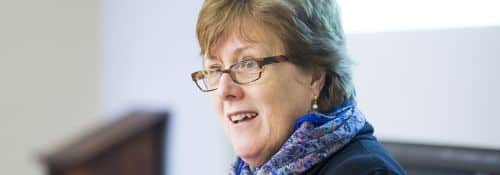
The Heart of the Western World
A Conversation with Dr. Marie-Claire Morellec
By Kokko Tso
“To know by rote is no knowledge, and signifies no more but only to retain what one has entrusted to our memory.” – Michel de Montaigne, Essays
While some might associate the study of a foreign language with boring memorization of grammar and syntax, students who choose to pursue the study of French at Hillsdale receive more than just language training. They are immersed in and given a full appreciation of the French language and heritage. Montaigne writes, “That which a man rightly knows and understands, he is the free disposer of at his own full liberty.” At Hillsdale, students in the French department can say that they rightly know and understand their chosen field of study.
Why should students study French? For one, the French language is quite beautiful. Dr. Marie-Claire Morellec, chair of the French department, says that she often tells her students, “Even if you don’t understand the words, just close your eyes and listen to the music of the language—that is something that cannot be translated.”
But perhaps the most important reason to study French lies in the fact that Western civilization draws heavily from French history and culture. Dr. Morellec explains, “Philosophy students cannot study the Enlightenment without bumping into Montesquieu or Rousseau, or contemporary philosophy without reading Sartre or Camus. English majors cannot talk about contemporary literature without examining the influence of Balzac, Stendhal, or Proust. And without Claude Monet, artists in the Western tradition would not have had Impressionism. French philosophy, literature, art, history, culture—they have been at the heart of what the Western world is today.”
This idea of connecting many different fields in a liberal arts education forms the foundation of the French program at Hillsdale. While the French professors give all students a solid foundation in the mechanics of the language, Dr. Morellec emphasizes the importance of French literature and cultural context in their curriculum.
“We want our students to know about literature, history, art, politics, and philosophy. We want our students to be able to read, understand, and converse about these things because it will give them a background to better understand the rich heritage of the French language. Flaubert did not wake up one morning and say, ‘You know, I feel like writing Madame Bovary. I think that’d be cool.’ He wrote one of the most important nineteenth-century novels in the context of his own time, and you need to study that context in order to fully appreciate it.”
Another key component of the French program is Hillsdale’s partnership with various foreign study programs in France. Faculty highly recommend students pursue study abroad opportunities, and most majors and minors will complete either a summer or semester of study in France.”Foreign travel has always been a part of a classical liberal arts education,” says Dr. Morellec. “I think it’s even more important in a world where we like to talk about a global economy. You need to be able to understand the customs of different cultures if you want to participate in international affairs.” Hillsdale’s primary French study abroad program is based in Tours at the Universite de Touraine, though the French department works with students to place them in programs that best fit their needs and interests.
“Learning French is a very humbling experience,” Dr. Morellec concludes. “All of a sudden, you’re like a child trying to figure out how to communicate, and it can be frustrating. However, the rewards are great: the intellectual satisfaction, the opening of your world to a rich culture. And isn’t that what a liberal arts education is all about?”
Kokko Tso graduated from Hillsdale College in 2013 with majors in music, Latin, and history. He currently works for his alma mater as the Digital Content Manager.